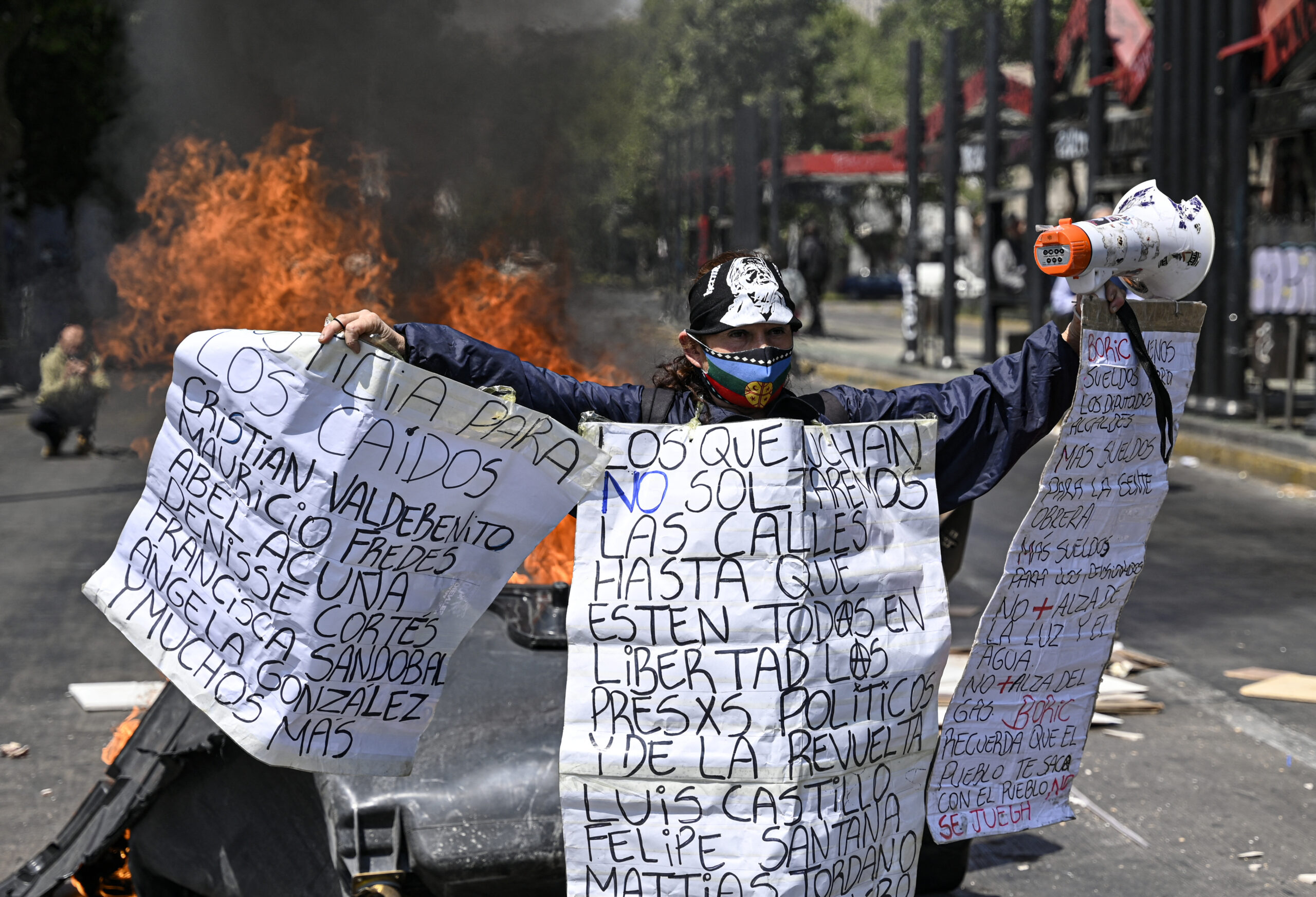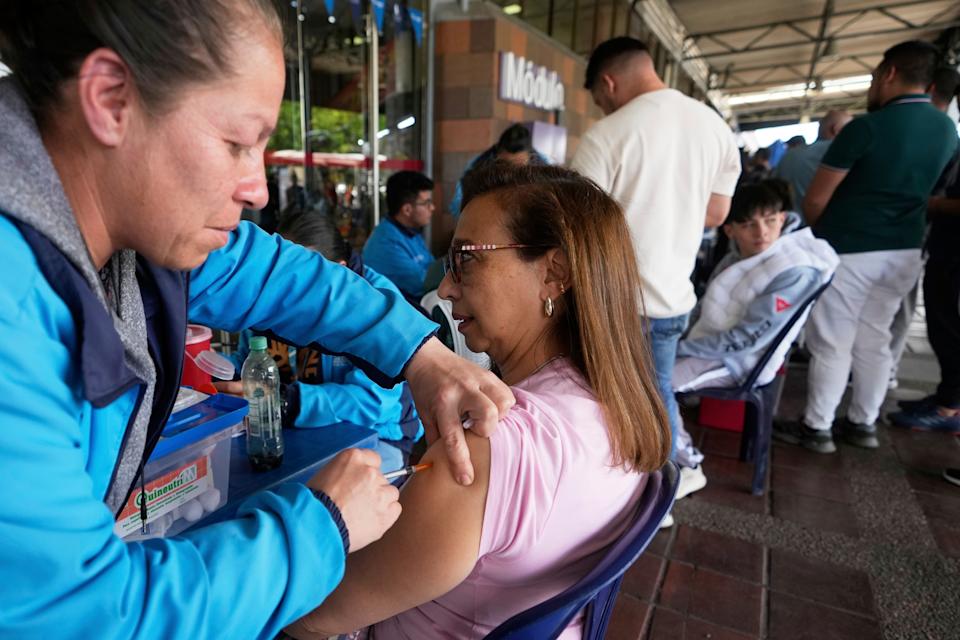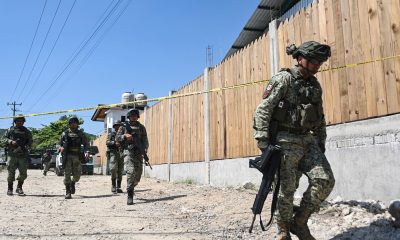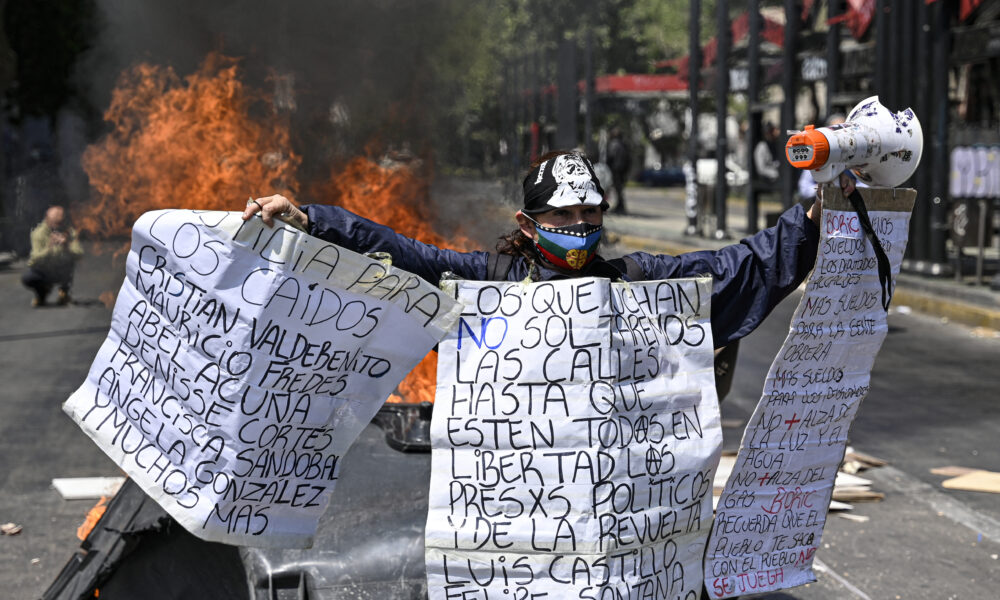International
Fresh protests to mark anniversary of Chile revolt

AFP
Hundreds of Chileans, mainly students, protested in Santiago Tuesday, erecting burning barricades to mark three years since a social uprising they say has not yet yielded the desired societal change.
Demonstrators wearing goggles and facemasks as protection against tear gas stopped car traffic on the central Alameda avenue, and several metro stations were shuttered.
Police deployed 25,000 officers to keep the peace, and used water cannon to disperse trouble-making demonstrators in at least one venue.
Many shops closed early, or did not open at all, while schools sent pupils home early in a country where demonstrations in recent years have frequently been marred by clashes with the security forces.
“We have gained nothing” in the three years since the movement began, said Andrea Valdebenito, a 43-year-old social worker who was among those gathered.
The protests came exactly three years after the start of a mass revolt against a rise in metro fares in 2019 that quickly escalated into a general clamor for better conditions and social equality.
The government suspended the price hike but protests continued, and dozens were killed over months of clashes. Hundreds of people were injured.
The demonstrations kickstarted reforms that included the government’s agreement to the drafting of a new constitution to replace the one inherited from the military dictatorship of Augusto Pinochet and perceived as market-friendly.
Last December, Chile elected a leftist president in Gabriel Boric, who supported the constitution-writing process.
But last month, nearly two-thirds of voters rejected the proposed draft despite the new revolutionary mood, amid concerns that parts of the document were too far-reaching.
A constitutional provision to legalize abortion was a key stumbling block in the conservative, majority-Catholic country.
Boric, a former student leader who had supported the 2019 protests, on Tuesday called for a new social dialogue to give shape to much-needed social reform.
The 2019 uprising, he said, “was an expression of pain and fractures in our society that politics, of which we are a part, has failed to interpret or answer.”
Boric came to office with promises of turning the deeply unequal country into a greener, more egalitarian “welfare state.”
International
Arsenal stun Real Madrid at the Bernabéu to reach Champions League semifinals

Arsenal enjoyed a “historic night” on Wednesday after defeating Real Madrid 2-1 at the Santiago Bernabéu, knocking them out of the Champions League quarterfinals, midfielder Declan Rice said.
“It’s such a special night for this club, a historic night for this club,” said Rice, who scored twice in the first leg in London, speaking to TNT Sports.
The English international was named Man of the Match in both legs — the 3-0 win in London and the second leg in Madrid.
“It’s amazing. I knew we were on an upward trajectory and we’ve done incredibly well in this competition. We deserve it and we have full confidence in our coach. Reaching the semifinals is unbelievable,” Rice added.
International
DeSantis’ immigration crackdown sparks alarm in Venezuelan Communities in Doral

Florida, the U.S. state with the third-largest immigrant population, has become the most aggressive in targeting undocumented immigrants, largely due to pressure from Governor Ron DeSantis. This shift has led Latino-majority cities like Orlando and Doral to authorize their police forces to assist in immigration enforcement.
In Doral — part of the greater Miami area where 70.7% of residents are immigrants and 48% are of Venezuelan origin — the City Council is expected to approve a measure this Wednesday allowing local police to collaborate with Immigration and Customs Enforcement (ICE), despite opposition from neighborhood groups and human rights activists.
“It’s yet another betrayal,” said Susana Ríos, a 57-year-old Venezuelan woman currently under Temporary Protected Status (TPS), whose extension was denied by the White House and is now being challenged in court.
Meanwhile, José González, a 21-year-old immigrant, said he feels “abandoned.” He can’t stop thinking about the images of Venezuelans deported to El Salvador without due process. “We’re all in danger,” he warned.
International
Bogotá residents line up for yellow fever vaccine amid national alert

David Suárez went to a public health center in Bogotá on Wednesday to get vaccinated against yellow fever. It wasn’t originally in his plans, but he responded to a call made just hours earlier by President Gustavo Petro, who announced he will declare a health and economic emergency due to a new outbreak of the disease that has already left more than 30 people dead, mostly in the central-western region of the country.
“I got vaccinated for two reasons: first, for my own health because I’m traveling, and second, for a social reason — simply to follow the president’s guidance and be aware that this is a problem for all of us,” said Suárez, a 39-year-old teacher, to The Associated Press.
Like Suárez, dozens of people were waiting in line for the vaccine at Bogotá’s main intercity bus terminal, a key transportation hub especially crowded during travel seasons like Holy Week.
The teacher is traveling with his family to the department of Huila, which has activated a contingency plan due to its proximity to Tolima — the epicenter of the yellow fever outbreak — where a state of public calamity has been declared.
-

 International3 days ago
International3 days agoNightclub Collapse in Dominican Republic Claims 226 Lives
-

 Central America4 days ago
Central America4 days agoSpanish Ex-Congresswoman Calls for ‘Bukele-Style’ Security Policies in Europe
-

 International3 days ago
International3 days agoVenezuela accuses Guyana of “warlike intentions” after UK defense deal
-

 International4 days ago
International4 days agoTrump Authorizes Military to Take Control of Federal Land Along U.S.-Mexico Border
-

 Central America2 days ago
Central America2 days agoHonduran Police Offer $135K for Tips Leading to the Arrest of Romeo Vásquez
-

 Central America1 day ago
Central America1 day agoPetro questions Ecuador’s vote, cites reports of military control and arrests
-

 International2 days ago
International2 days agoMPV Denounces Electoral Blockade as Secretary-General is Disqualified for May Elections
-

 International2 days ago
International2 days agoMaduro Plans Major Workers’ March on May 1st to Defend Venezuela’s Freedom
-

 International1 day ago
International1 day agoColombia: Search continues for missing limb of italian scientist found dismembered
-

 International39 mins ago
International39 mins agoArsenal stun Real Madrid at the Bernabéu to reach Champions League semifinals
-

 International1 hour ago
International1 hour agoBogotá residents line up for yellow fever vaccine amid national alert
-

 International1 hour ago
International1 hour agoMexico refuses to restore ties with Ecuador while Noboa remains in office
-

 International47 mins ago
International47 mins agoDeSantis’ immigration crackdown sparks alarm in Venezuelan Communities in Doral

















